Welcome to my world of Idioms #5 - Cats Hide Their Paws
Dear Steemit friends:

One of my passions is studying the Chinese language. Much of this Chinese is derived from ancient language and based on some historical significance. In one of my previous posts, I introduced the idiom Teaching Fish to Swim and the story behind it. What we found out was that language itself is continuously evolving, the interpretations of these phrases taking on new uses as society changes. In the case of teaching fish to swim, the phrase was previously used to criticise those who liked to show off, nowadays it has also become a term which encourages people to challenge old ideas and not be afraid to take a lead in forming new ones.
Today, i'd like to introduce another interesting idiom:
Da4 Zhi4 Ruo4 Yu2 - Semantic translation : "great intelligence may appear to be stupidity."
Today's Chinese Idiom story —— Cats hide their paws
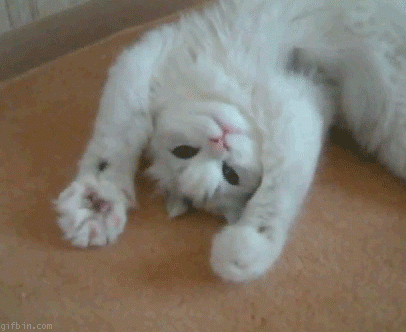
大智若愚 (Da4 Zhi4 Ruo4 Yu2) describes someone who appears inept or stupid when dealing with life situations and yet, may infact be highly intelligent. It might be something simple such as responding slowly, or acting in such a way that puts them at disadvantage, on the surface not allowing their intelligence to carry them.
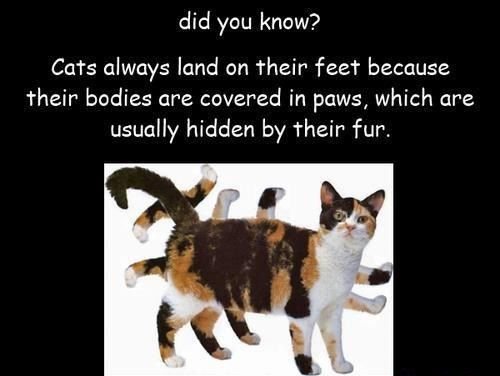
In English, this idiom has often been compared to the phrase, Cats hide their paws.
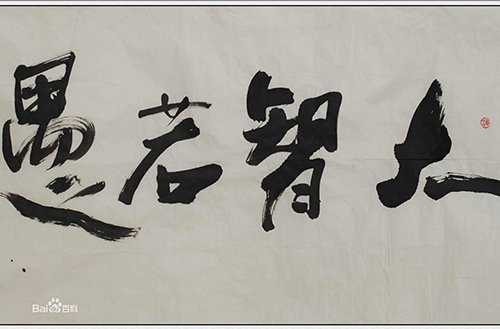
大智若愚 originated from the southern song dynasty, a great thinker named Lang Ye wrote : "Great heroes may appear timid and the wise may appear stupid." What he meant was that those who possessed courage and valor may not readily show it and those who carry ability and wisdom may display little evidence so. The phrase is widely known and used, even a movie was named after it.
Historical examples of people who personified this phrase
In the late warring states period, a general named Wang Jian approached the Qin Emperor prior to leaving for battle and insisted that the Emperor bestow more land and property to him. To many of the generals contemporaries, this seemed like an act of stupidity, surely a General should fulfil his duties and obey the Emperor. It isn't his place to make demands. However, Wang Jian replied to the Emperor : "The Qin Emperor has given me sole command of the state's army, this has made him feel uneasy for fear of myself leading a revolt against the Qin Emperor. Therefore, my demands for land and assets may come across as greed for wealth, rank and splendour, but this fact will serve to assuage the emperor of further worries of my allegiance for I would be compensated handsomely and my accrued stake to defend and serve the country would overwrite any notion of revolt."

I believe that every situation can be viewed top down, or bottom up. How behaviour or action is perceived depends on which angle you look at. To the general public, a person who possesses and behaves "大智若愚" might be considered unintelligent, but they often fail to appreciate that the person may have a higher comprehension of the situation and remain fully in control. This is trait I believe all successful people possess.
A social example of
大智若愚 a cat hiding it's paws.
The Duke of Windsor was responsible for looking after guests at a royal banquet. A waiter brings a bowl of water to the guests (the bowl of water is for guests to wash their hands). However, the guests proceeded to drink from this bowl. They assumed drinking the water was royal banquet ettiquette. The nobles saw their behaviour and became agitated yet amused. However, the Duke of Windsor remained calm and collected, unaffected by the unorthodox behaviour of the guests and proceeded to drink water from his own bowl too. In the end, the atmosphere was quickly changed from awkward to harmonius, thanks to the Duke of Windsor.

In my opinion, the Banquet's success must be credited to the Duke of Windsor. Instead of behaving like someone who knows better, he chose to echo the guests and act none the wiser, drinking the water along with them. In this situation, he played a cat hiding it's paws to sway the awkwardness away. Obviously he understood on a higher level, the importance of adapting to different social contexts and in this case, saved everybody from cultural dispute.
An example of a cat hiding its paws in everyday life
A monk once asked a young man, "If I gave you a choice between a fishing rod or a basket of fish, which would you take?" To the monk's dismay, the young man chose the basket of fish. The monk then tried to pass his wisdom to the young man by saying "You think too superficially! Once you finish the fish, there will be no more left, but if you choose the fishing rod, you can catch fish indefinitely." To the Monk's surprise, the young man replied : "I was going to sell all the fish in the basket and use the money to buy several fishing rods, then I was going to rent the fishing rods out for money."

What we learn from this is that even in everyday life, those who are intelligent often seem impervious to reason and often have a "basket" of surprises up their sleeve. Superficially they may seem difficult to reason with, but it's only because they're different to most other people and thinking out of the box.
My Story
In my own life, I'm often playing the role of the cat hiding it's paws, but unlike some of the more lofty examples above, I usually end up just acting silly and fail to show my true intelligence. For example, despite knowing that eating a-lot will make me fat, and my friends recommending me to stop, I just can't help but continue..

Despite knowing i'll be late, I still can't get out of bed.
More often than not, it's hard to tell the boundaries of smart and dumb behaviour apart. Nowadays, the cat hiding it's paws (大智若愚) has developed it's own counter-phrase with just a slight rearrangement of characters (大愚若智).
This means "the ignorant fool who seems intelligent".
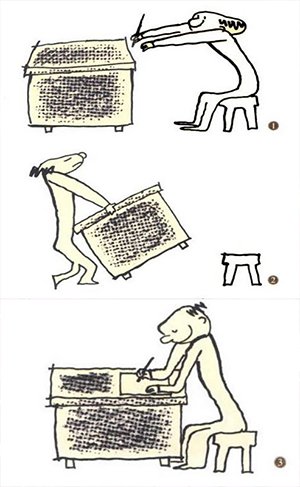
This is what happens when the cat doesn't hide it's paws..
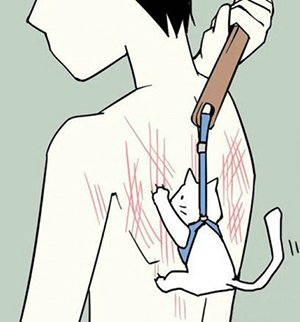
今天我想和大家分享另一个有趣的成语——大智若愚,请大家跟随我进一步了解一下这个成语吧。大智若愚是指非常聪明的人,处理很多日常事物时看来好像笨笨的,很迟钝很吃亏,没有显露出自己的才能。这个成语在英文里翻译成好玩的一句,猫咪隐藏它们的爪子。大智若愚,出自南宋时期,郎晔的词中,整个句子为:大勇若怯,大智若愚。形容内心很有勇气和胆识的人,有时候不会表现出来。才智出众的人,也常常不表现在外。之后也有以此为名的电影作品。
历史上大智若愚的人
战国末期秦国大将的王翦在出征打仗前,执意向秦王请求赐予田地和房屋,秦王的手下急忙劝阻王翦,不要太贪心。而王翦回答:秦王把全国的部队交给我一人指挥,心中难免会不安,所以我多次求赏田地财产,外面人看来我是为荣华富贵,而实际是为了安定秦王的心,这样他就不会怀疑我要造反了。
我认为所有的事情都有两面性,大智若愚的人只是让大众看到了他迟钝的一面,然而他们内心深处懂得掌控全局的一面,才是他们能够做成功事情的原因。
社交中大智若愚的人
英国的温莎公爵招待贵客的宴会上,侍者端来洗手盆放在客人面前。客人以为这是英皇室的待客礼仪,于是端起来一口喝掉,一时间在座的英国贵族都慌神了,只见温莎公爵神色淡定,也喝掉了洗手盆的水,最终宴会在和谐的气氛中结束。
我认为这次宴会的成功,归功于温莎公爵没有聪明的去指正贵宾的做法,而是装了糊涂,也将洗手水喝掉,从挽救了尴尬的气氛。所以有时候,大智若愚的举动可以挽救一些突然的事情,给社交中的双方一些面子。
生活中大智若愚的人
一位高僧问一个年轻人,一根鱼竿和一筐鱼,你选哪个?年轻人说,我选择鱼。高僧摇头惋惜道:你的想法太肤浅了,鱼吃完了就没有了,但是有了鱼竿你可以钓到更多鱼。然而没想到年轻人回答到:我是想卖掉这筐鱼,之后就可以买很多鱼竿,再把鱼竿租给别人,收租金。
所以在生活中真正聪明出众的人,常常会说话做事让人觉得不可理喻,非常惊讶,但其实他们是想法深远,与大众不在一个层级,所以交流困难。今天的成语故事就讲到这里,希望这些有趣的内涵能给你一些启发。
Welcome to my world of Idioms #1——4
Teaching fish to swim
Love me, love my dog
To put the cart before the horse
One man's meat is another man's poison
As usual a very good write up on the cats paws hidden in the title itself. Great recovery to an awesome write up. Thanks for sharing! Namaste :)
I think your english translation may be a little bit off.... A cat hides its claws, not its paws.
oh! you might be right! I think i'll stick to this one though as it's the translation that seems to be most commonly taught. I suppose closing it paws kind of suggests that it's claws are hidden since cats have their claws withdrawn most of the time.
Great one! Didn't know this one. One of my favorite chinese cat idioms is 猫哭老鼠 ... or cat cries over dead mice. It's so spot on with cat psychology.
Thanks! That one is definitely more 形象!
I cry over dead minnows <x))))>< (=;ω;=)
LOL! Great Post as always ;)
hope it lives up to the funnyman! :D
That cat looks like it is playing that chinese drinking game which I still don't understand!
Haha, maybe i'll introduce the chinese drinking games sometime.. Although honestly i'm not very good myself..
When I visited China, I was good at this one drinking game where each person displays some number of fingers on their hand and the two players race to call out the sum of the two hands. Eventually they decided I must be cheating, since we had to call out the answer in chinese numbers and they thought they should easily win. But I was always good at this kind of game, because we had a game like it in school where we use to race to call out the answer to a multiplication problem shown via flash cards, so it actually seemed like a really easy game.
Perhaps more surprising, I was hanging out with a bunch of ping pong players while I was there, but they had never played "beer pong" before. We had to modify the rules a bit, since we were playing with baijiu instead of beer and it was definitely more challenging to make it into those small cups... So between the higher difficulty level and the higher alcohol content, playing skill went down a lot faster.
That's interesting, where was this drinking game introduced to you? We usually play it in bars or private karaoke rooms. The interesting thing about the game is that winner (person guesses the sum of all sets of open hands (more than 2 ppl can play)) gets to call again. Since these games are often very fast paced, you could almost guarantee the next sum total deterministically by calling straight after your first correct call.
Suppose you have 10, and I have 5, and I called 15, I would be the winner and be entitled to the next call, I immediately close my one open hand and call 10 knowing my opponent still has his hands open and I win again.
Since the prerequisite for winning is two straight correct calls, that's one way of almost guaranteeing a win!
Did you ever get a ping pong ball into a baijiu cup? That seems like quite a feat !
We were playing in a private dining room, they were hosting me, and there were probably about 12 people at the table. We were playing 2 at time, and the winner would keep playing and the next person around the table after the loser would play. So you couldn't take advantage of the trick you mentioned, since the sum was from the new player. I guess the way to cheat would be to delay showing your hand versus the other guy, then sum up based on what you knew you would show (I think this is what they thought I must be doing), but the idea was both players should show pretty simultaneously.
Yes, I was able to do it more often than I thought I could. The funny thing was, most of the guys were much better than me at ping pong, but of course that didn't translate to their ability to get the ball into a cup, so I could see several of the better players were frustrated that they couldn't do it as they repeatedly attempted it. So I got some minor revenge for all beatings they gave me at the ping pong table :-) But, honestly, it's a privilege to play guys like that, and you're really happy to have the chance to get beaten by them.
@sweetsssj
I like the way you wrote the syllabication makes it easy to read and imagine the sound.
It's true - better to pretend you're dumb sometimes, saved a lot of Jew doing that in WWII.
so the cat at the gif .. playing "close open".?.. so cute !
I thought some people may have learnt how to read Pinyin so would be helpful. Either way it's easier to identify for non Chinese speakers.
I think in WWII the agenda was just ethnic cleansing resulting in mass genocide. Not sure how much pretending dumb as opposed to pretending you're not a jew would help.
Cat's explain everything!
@sweetsssj yes it's easy to read it indeed
as for the Jews who did that, there were times when some Jews were asked what they do for a living and pretended they were not highly educated and are doing more of a blue - collar job and they we're spared compared to those who showed they know it all.
Such incident was shown in some of the scenes in Schindler's list.
Excellent post. Much wisdom here as well as being educational.
thanks arthur, glad you picked up something :)
You are beautiful! Your post is fine too :)
Thank you very much ! Very kind!
du är fint ock katten
outrageous post my m8 ! i had a smiliar taught on my mind as well. Follow for follow ! :D